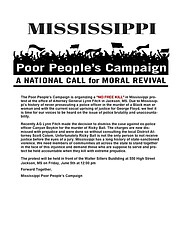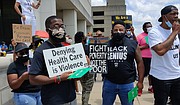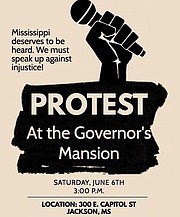Wednesday, June 3, 2020
Four of the Jackson Black Lives Matter protest's primary organizers—from left: Calvert White, Taylor Turnage, Maisie Brown and Timothy Young—speaking to media after the event's end on June 6, 2020. Photo by Nick Judin
Calvert White, vice president of Alcorn State University’s chapter of the NAACP, says George Floyd is a “martyr,” killed by an oppressive power complex that affects everyone in the country.
A video captured Minneapolis, Minn., police officer Derek Chauvin using his knee to pin Floyd’s neck to the street for nearly nine minutes, sparking nationwide protest over systemic racism and brutality inside law enforcement that protesters argue is destructive to their humanity and civil rights. Floyd committed no act of violence before his death at the knee of a police officer with three others guarding the action. Convenience-store employees had called the police, believing Floyd paid for cigarettes with a $20 counterfeit bill, but with no evidence that he was aware that it was fake.
The Hill reported that the store’s owner later said he would no longer report fake bills to the police, due to the violent reaction to Floyd. “Police are supposed to protect and serve their communities; instead, what we’ve seen over and over again is the police abusing their power and violating the people’s trust. We realize now that escalating situations to the police almost always does more harm than good, even for something as harmless as a fake bill,” Mahmoud Abumayyaleh, the owner of Cup Foods, wrote on Facebook Sunday.
Calvert White cautions that the nationwide protests represent far more than outrage over Floyd’s killing alone, however. “George Floyd’s death is symbolic of police brutality all over the nation. It’s very clear that the justice system is inherently flawed,” White told the Jackson Free Press.
White, along with co-organizer Maisie Brown, are organizing a peaceful protest at the Governor’s Mansion in Jackson at 3 p.m. Saturday, June 6, against police brutality and the systemic racism that bolsters and protects it.
‘Floyd Is the Straw that Broke the Camel’s Back’
Maisie Brown, the 18-year-old youth program director at the Institute for Democratic Education in America and a recent Murrah High School graduate, considers the Minneapolis death a flashpoint. “Floyd is the straw that broke the camel’s back. Back in the ‘90s, our parents had Rodney King. We’re not enraged because this is the first time we’ve seen it. We’re enraged because we’ve seen it too many times before.”
Photo Gallery
'No Free Kill' Protest in Jackson
The Mississippi Poor People's Campaign led the 'No Free Kill' protest at the state Capitol on Friday, June 5, to demand the evidence that led to the dismissal of the charges against white former Columbus police officer Canyon Boykin for the 2015 shooting of Ricky Ball, a black man.
The organizers of the Jackson protest uniformly stress that the action will be peaceful, including voices from black students, activists, community leaders and artists.
“We want to march past the old Capitol, up to the Capitol, and back to the Governor’s Mansion, and let them know—not just Tate Reeves, but any white, racist politician in the state and the nation—know that Mississippi is not just the ones you care about: there are a lot of people here who are eager for change,” Brown said of the Saturday protest. She is also an occasional columnist for the Jackson Free Press.
The Saturday event will follow Friday’s gathering organized by Mississippi’s Poor People’s Campaign, which will take place outside Attorney General Lynn Fitch’s office at the Walter Sillers Building on June 5 at noon.
That event will protest Fitch’s move last week to dismiss the manslaughter case against Canyon Boykin, the white ex-police officer from Columbus who shot and killed Ricky Ball during a traffic stop in 2015. Fitch dismissed the case against Boykin with prejudice, meaning the state may not bring the case back up on the same grounds if future evidence emerges.
Danyelle Holmes, national organizer with Repairers of the Breach and the Poor People’s Campaign, says far too many questions surround Boykin’s shooting of Ball for a permanent dismissal. She ties the action back to the national unrest over racism in the justice system.
“We have a flawed system, not only on the national level, with our president, but on the local level, with our state government. … African Americans can't rely on the system for justice. We have not been able to rely on the system for many years,” Holmes said.
The Mississippi Poor People’s Campaign is sending an open letter to Fitch in protest of the decision in the Ricky Ball case. “Historically, black victims have not received the same treatment in the judicial process in cases similar to this one. Mr. Ball is not the first victim of a police shooting that has gone unprosecuted. In Mississippi, no police officer has ever been convicted of killing a black person, though there have been multiple police-involved shootings,” the letter reads.
‘The Work Has to Start Within White People’
Across the nation, stunning outpourings of unrest, anger, and solidarity have fueled a week of protests and riots in virtually every major U.S. city. In response to that civil unrest, political leaders and media figures have attempted to set the parameters for “legitimate” protest, an act Maisie Brown finds offensive and unhelpful.
“I don’t think it is the role of the oppressor to tell the oppressed what’s an appropriate response,” Brown said. The march on Saturday is in every sense a peaceful protest, but Brown has no interest in condemning riots as illegitimate.
“I’m in no way angry with people who chose a different route,” she said, adding, “As Martin Luther King Jr. said, riots are the language of the unheard.”
The organizers said white allies, too, have to understand which forms of support are constructive, and which are not.
“I want white people to support this movement,” Brown said. But, she added, ”white people have to mobilize themselves. We can’t fix what wasn’t made for us. We can’t fix what we didn’t break. The best thing you can do to support me is to talk to your people. … The work has to start within white people.”
Calvert White wants a broad coalition, but asked that participants let them lead. “Educate yourselves, fight with us … understand that we have to shout to be heard,” he advised.
Gov. Tate Reeves on ‘Anarchists and Agitators’
U.S. Attorneys Mike Hurst and Chad Lamar issued a joint press release this morning addressing Floyd’s death and the ensuing protests. “What happened to George Floyd in Minnesota was heartbreaking and a travesty, but I am proud of the way Mississippians have responded by exercising their First Amendment rights peacefully,” Hurst said in the release.
But the support for peaceful protests was leavened with a warning. “Law and order will be maintained coequally with the lawful exercise of individual liberties. We took an oath to support and defend the American people and the Constitution, and we will continue to do just that,” Hurst said in the statement.
Gov. Tate Reeves, responding to the nationwide protests now coming to Mississippi, swore that “we will never suppress speech and protest in Mississippi,” but also threatened the “full force of our state” to “deal with those who only want disorder and violence.” At his Monday press conference, Reeves said the two groups were separate, calling the “anarchists and agitators from other parts of the county … spoiled kids who are privileged enough to not know consequences.”
But many protests over the last week have turned violent after the intervention of police, not “anarchists and agitators.” Videos from national news outlets and social-media feeds alike have shown a heavily armed police presence attacking and “kettling” otherwise peaceful protests in different cities around the country.
As for their goals, Brown and White understand the enormity of the social reform their movement is embarking upon. In the short term, they demand the voices of their community be heard. Beyond that, they stressed the need for significant, empowered representation for their community in policy and policing decisions.
White wants meaningful legislation on police brutality and violence, and a liaison between law enforcement and the communities they serve.
Brown also called for an end to the cultural signifiers of racism: symbols like Confederate Heritage Month, the present Mississippi flag and what she described as the overwhelming need to turn basic questions of human dignity into a debate.
The top photo for this story was changed after publication to include more of the event's organizers.
Email state reporter Nick Judin at [email protected] and follow him @nickjudin.



